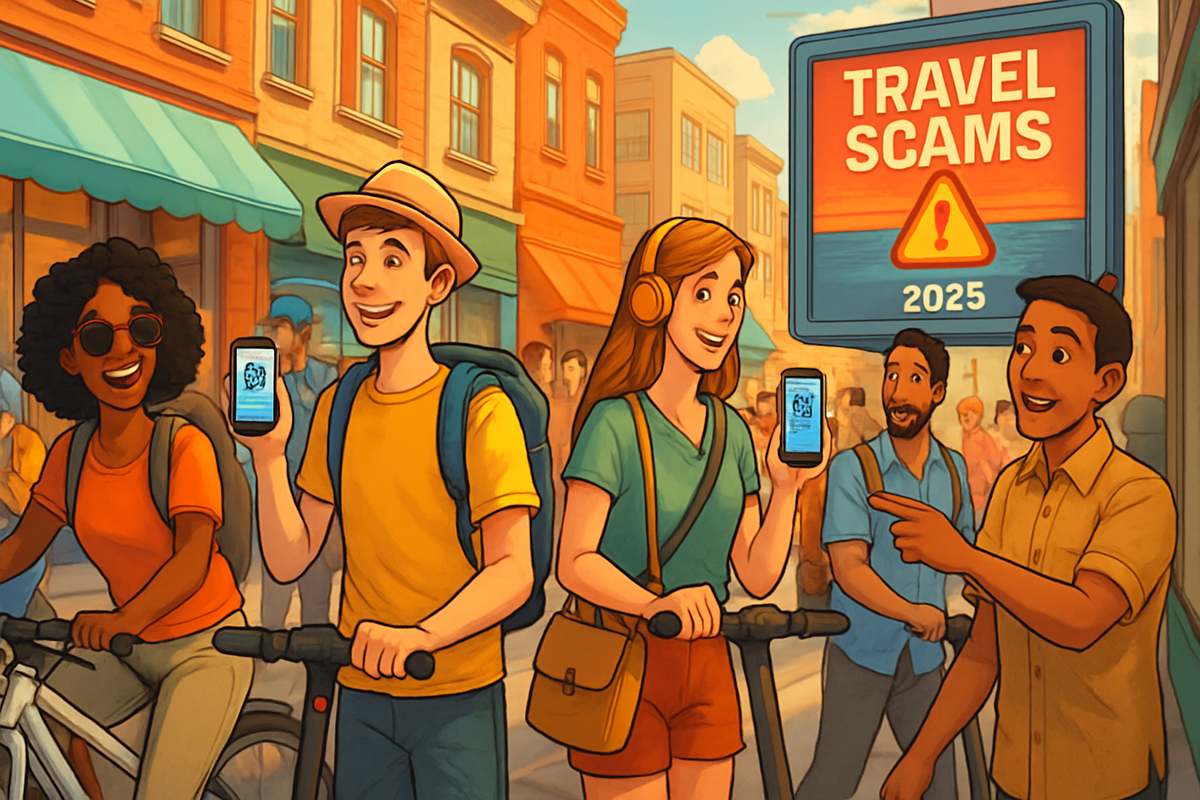Travel Scams EXPOSED: The Ultimate 2025 Playbook for Outsmarting AI Fraud, QR Cons, and Voice Deepfake Traps
In 2025, travel scams use AI, deepfakes, and digital trickery. Arm yourself with our playbook for scam-proof adventures, featuring tips that even your grandma could follow. Don't let scammers ruin your globe-trotting dreams—be the savvy traveller.

Welcome to the 2025 Travel Scam Survival Guide
Let’s play a game: Imagine you’re standing in a sun-splashed plaza, phone in hand, ready to scan that QR code for a local bike rental. Or maybe you just got a panicked call from "your daughter" in Paris, begging for bail money. Or perhaps that dreamy beachfront Airbnb deal seems a little too perfect.
Would you spot the scam? In 2025, travel fraudsters are wielding AI, deepfakes, and digital trickery sharper than a customs agent’s glare. But don’t worry—this playbook is your passport to scam-proof adventures, delivered with a wink, a checklist, and a toolkit even your grandma could use.
"The only thing more contagious than wanderlust in 2025 is the rise of AI-powered travel scams. Consider this your digital vaccine."
— Funaix Editorial
Can You Spot the Scam? (Quick Quiz)
- A QR code at a tourist hotspot offers half-price e-bike rentals. Do you:
a) Scan and pay immediately
b) Check the web address and look for sticker tampering
c) Post it on Instagram for validation? - You get an urgent call from your spouse abroad. The voice is theirs, but the number is unknown and they want money wired. Do you:
a) Panic and send cash
b) Hang up, call them back on their real number; ask for your family “safe word”
c) DM them a meme instead? - You find a government portal for a travel visa with a .com domain and a 500% markup. Do you:
a) Pay up!
b) Check the official government domain or use a trusted link
c) Ask ChatGPT to handle your paperwork (please, don’t)?
If you answered mostly “b,” congratulations—you’re already dodging 2025’s sneakiest scams! If not, keep reading. We’ve got you covered.
The Big Five: 2025’s Most Devious Travel Scams
1. AI-Generated Booking & Fake Government Portals
What it is: Ultra-realistic fake sites (for flights, hotels, or visas) built with AI and topped with official-looking logos, customer support chats, and payment systems. They’ll even email you confirmations—none of it real.
How to spot & stop:
- Always double-check the web address (look for https & correct spelling!)
- Book through trusted platforms or official government sites (bookmark them!)
- Be extra wary of deals or forms found via ads or unsolicited emails
2. QR Code Bait-and-Switch
What it is: Scammers slap their own QR stickers over real ones—leading you to phishing sites that steal your card or login info. Seen on e-bikes, museum tickets, or even restaurant menus.
How to spot & stop:
- Scrutinize the QR code’s placement and sticker quality
- Before entering info, check that the website is legit (not misspelled or odd domains)
- If in doubt, type the official URL manually or ask staff for confirmation
3. Deepfake Emergency Calls (AI Voice Cloning)
What it is: Scammers use AI to mimic a loved one’s voice, calling family with a fabricated emergency and urgent request for money. The "voice" is eerily convincing.
How to spot & stop:
- Establish a family safe word before travel (see below!)
- Always hang up and call back on the real number
- Never send money based on a single incoming call, no matter how real it sounds
4. ATM Skimming & Fake Wi-Fi Networks
What it is: Crooks install hidden card readers or set up rogue Wi-Fi hotspots to capture your banking details and passwords.
How to spot & stop:
- Use ATMs only inside banks or trusted hotels
- Check for loose parts or odd attachments on machines
- For Wi-Fi, use a VPN and avoid logging into sensitive accounts on public networks
5. The Oldies (But Bolder): Overpriced Rides & Fake Closures
What it is: Taxi drivers disabling meters, “helpful” strangers insisting attractions are closed (and hustling you to their cousin’s shop), and other analog classics—now with digital twists.
How to spot & stop:
- Use official taxi stands or ride-hailing apps
- Verify attraction hours on official sites or with hotel staff
- Be politely skeptical of unsolicited advice
Your Scam-Proof Traveler’s Toolkit for 2025
- Password Managers: Use a trusted app (like LastPass, Bitwarden, or 1Password) to avoid reusing passwords across travel sites.
- VPN: Shield your connection on public Wi-Fi. (NordVPN, ExpressVPN, and Bitdefender all get high marks.)
- Browser Extensions: Install extensions that flag phishing sites and block malicious popups (uBlock Origin, Bitdefender TrafficLight, etc.).
- Travel Insurance & Identity Protection: Consider services that offer fraud support and emergency assistance.
- Family Safety Apps: Apps like Life360 or Google Family Link help you stay connected and verify real-time locations.
- Reverse Image Search: Use Google Images or TinEye to check if a rental listing photo appears elsewhere (a red flag for fakes).
"A little digital hygiene goes a long way. The best defense? Layered tools, a skeptical mind, and a dash of street smarts."
The Family Safe Word Contract
Print this (or screenshot and share it in your family group chat):
2025 Family Travel Safe Word Agreement
- Our secret word or phrase is: [__________]
- If anyone gets a call/message about an emergency, ask for the safe word
- If the caller can’t supply it, HANG UP and verify directly
- Update the word before every trip!
Yes, it feels like spycraft. But in the age of AI voice clones, it’s just common sense.
What To Do If You’ve Been Scammed
- Stay calm. Take screenshots, save emails/texts, and write down everything you remember.
- Contact your bank or card provider immediately to block or reverse suspicious transactions.
- Report the scam to local police and, if abroad, your embassy or consulate.
- Change all relevant passwords and monitor your accounts for further activity.
Many banks and travel insurers offer fraud protection—but only if you act fast!
Pro Tips: Outsmarting Tomorrow’s Scammers (Without Losing Your Cool)
- Pause before purchase: If a deal feels urgent, that’s your cue to slow down.
- Don’t overshare: Post vacation pics after you return—not while you’re away.
- Trust your gut: If something feels off, it probably is. (Gut feelings: now AI-resistant!)
- Stay in the know: Subscribe to Funaix Insider for free—get fresh scam alerts, smart travel news, and join a community where only subscribers can share and discuss in the comments. Subscribing is free (for now!), and you’ll never travel uninformed.
Your Next Steps: Be the Friend Who Outsmarts the AI Scammers
Travel is about adventure, not anxiety. With this playbook, you don’t just dodge scams—you become the digital hero of your travel crew. Share this guide, print the safe word contract, and flex your scam-spotting skills at every airport lounge.
“The world is open, the tech is powerful, and your best defense is a smart, skeptical mind—plus a community of fellow insiders.”
Ready to travel smarter? Subscribe free and unlock member-only comments, tips, and up-to-the-minute scam alerts—before your next boarding pass.
Sources: Travel and Tour World, Google Trust & Safety, Bitdefender Hot for Security, Travel Off Path.
Published August 20, 2025. Stay smart, stay safe—and see you in the comments (subscribers only!).




